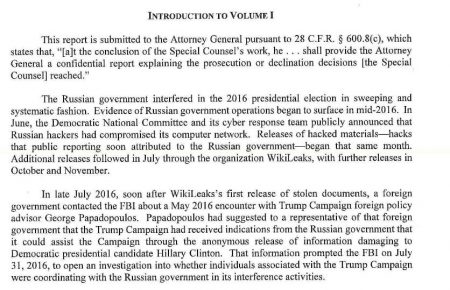“THAT’S NOT WHAT STARTED THE INVESTIGATION…”
by Sharon Rondeau
 (Jun. 2, 2019) — On the June 2, 2019 edition of “Sunday Morning Futures” with Maria Bartiromo, the final guest, appearing at 10:54 AM EDT, was cut off by the computer-generated conclusion to the program, which occurs each week at 10:57 AM.
(Jun. 2, 2019) — On the June 2, 2019 edition of “Sunday Morning Futures” with Maria Bartiromo, the final guest, appearing at 10:54 AM EDT, was cut off by the computer-generated conclusion to the program, which occurs each week at 10:57 AM.
As she has in the past, Bartiromo hosted former U.S. District Court Judge Michael Mukasey, who served as Attorney General of the United States under President George W. Bush during the last 14 months of his administration.
Bartiromo asked Mukasey if he believes there will be accountability for those who launched the Trump-Russia “collusion” narrative and FBI investigation which ended in March when Special Counsel Robert Mueller’s team found insufficient evidence of a conspiracy between the Trump campaign and Russia to affect the outcome of the 2016 election after its own 22-month investigation.
Mukasey responded in the affirmative, stating that he has great confidence in Attorney General William Barr’s appointment of U.S. Attorney for the District of Connecticut John Durham to conduct a comprehensive investigation into the origins of the “collusion” allegations.
Durham has successfully prosecuted both Democrats and Republicans, and, Mukasey pointed out, has investigated CIA and FBI agents, including those involved in the Whitey Bulger case in Boston in the 1980s during which four innocent men were sent to prison to protect Bulger’s confidential-informant status. Mukasey did not mention that the assistant U.S. attorney for that region at the time was Robert S. Mueller, III.
Speaking of the origins of the Russia investigation which clouded Donald Trump’s presidency from the outset and even prior to his taking office, Mukasey brought up a conversation which took place on May 6, 2016 between then-Trump informal advisor George Papadopoulos and then-Australian Ambassador to the UK Alexander Downer at the Kensington Wine Rooms in London.
The public narrative is that Papadopoulos told Downer that “the Russians” possessed “emails” stolen from Hillary Clinton’s private email account. According to the Mueller report, that information was conveyed in late July 2016 to the FBI, which five days later initiated a counterintelligence investigation into the Trump campaign.
In his book, “Deep State Target,” Papadopoulos wrote that Downer’s assistant had requested that he and Downer meet but that during the exchange, Downer’s demeanor was unexpectedly “hostile.” Additionally, Papadopoulos said, Downer held up his phone as if to indicate he was “recording” the conversation.
The transcript from Papadopoulos’s closed-door testimony to members of the House Oversight and Judiciary Committees last fall indicates that certain members of Congress appeared to believe that transcripts of the Papadopoulos-Downer conversation and others existed, suggesting that Papadopoulos was under some type of government surveillance.
Rep. Mark Meadows has since confirmed that “transcripts” exist and are contained in the large tranche of documents expected to be released after Barr declassifies them under an order Trump issued on May 23.
Papadopoulos is among six individuals prosecuted for “process” crimes stemming from the Mueller investigation. In early October 2017, he pleaded “guilty” to one count of lying to the FBI, serving 11 nights in federal prison late last year accompanied by community service and a $9,500 fine. In a recent video-interview with Mark Steyn, Papadopoulos said that as a result of information which has since come to light as well as the classified materials Barr has yet to release, he would not have made the same decision.
Papadopoulos has said he does not recall mentioning “emails” during the exchange with Downer. In a May 31, 2019 column, Kimberley Strassel of The Wall Street Journal Editorial Board wrote:
When Mr. Downer ended his service in the U.K. this April, he sat for an interview with the Australian, a national newspaper, and “spoke for the first time” about the Papadopoulos event. Mr. Downer said he officially reported the Papadopoulos meeting back to Australia “the following day or a day or two after,” as it “seemed quite interesting.” The story nonchalantly notes that “after a period of time, Australia’s ambassador to the US, Joe Hockey, passed the information on to Washington.”
My reporting indicates otherwise. A diplomatic source tells me Mr. Hockey neither transmitted any information to the FBI nor was approached by the U.S. about the tip. Rather, it was Mr. Downer who at some point decided to convey his information—to the U.S. Embassy in London.
In speaking about when the investigation began, Mukasey referenced “the first line of the Mueller report,” although he likely meant “the first page.” The first three paragraphs of the “Introduction to Volume I” dealing with Russian interference in the election on page 9 of the PDF state:

However, directly afterward, he told Bartiromo, “That’s not what started the investigation…” at which point the timer cut off whatever followed.

